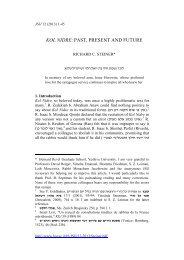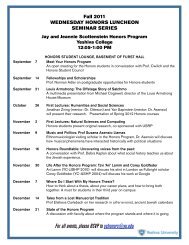David: The Meaning of a Structural Parallel in Psalm 78 - Yeshiva ...
David: The Meaning of a Structural Parallel in Psalm 78 - Yeshiva ...
David: The Meaning of a Structural Parallel in Psalm 78 - Yeshiva ...
You also want an ePaper? Increase the reach of your titles
YUMPU automatically turns print PDFs into web optimized ePapers that Google loves.
198 Α. Frisch I Vetus Testamentum 59 (2009) 190-198depend on the behavior <strong>of</strong> the <strong>in</strong>dividual k<strong>in</strong>gs (parallel to the everlast<strong>in</strong>gsanctity <strong>of</strong> the Temple), and the allusion to loyalty to <strong>David</strong>, demanded particularly<strong>of</strong> rebellious Ephraim—would seem to favor a date between Jeroboamsrebellion (1 Kgs xi 26-27, 40) and the destruction <strong>of</strong> the NorthernK<strong>in</strong>gdom.In conclusion, let us go back to the three problems we raised at the outsetand see how they can be solved <strong>in</strong> light <strong>of</strong> the thesis presented here. (1) Wenoted a l<strong>in</strong>guistic parallel between the first and seventh units and suggestedthat there is also a conceptual equation <strong>of</strong> the Lord s two gifts to his people.This provides a solid basis for the parallel between these two units, noted byZakovitch on formal grounds only. (2) We did not apply the obligation tobe faithful to the Torah, imposed on the people <strong>of</strong> Israel <strong>in</strong> the first unit, to<strong>David</strong> s descendants <strong>in</strong> the seventh unit, such that the cont<strong>in</strong>ued election <strong>of</strong>Jerusalem and <strong>David</strong> is conditional on the k<strong>in</strong>gs' behavior. Instead we emphasizedthe elements that are be<strong>in</strong>g compared: <strong>David</strong> (along with Jerusalem andthe Temple) 14is equated with the Torah as the Lords gifts to the people.(3) <strong>The</strong> k<strong>in</strong>gs <strong>of</strong> the House <strong>of</strong> <strong>David</strong> are not called on to display loyalty tothe Lord as a condition <strong>of</strong> dynastic cont<strong>in</strong>uity. Rather, if any such idea therebe, it is that the people must be loyal to the House <strong>of</strong> <strong>David</strong> and Jerusalem 15and not follow <strong>in</strong> the errant footsteps <strong>of</strong> the rebellious tribe <strong>of</strong> Ephraim.14)On the emphasis <strong>in</strong> <strong>Psalm</strong> <strong>78</strong> on the election <strong>of</strong> <strong>David</strong> (rather than on the election <strong>of</strong> Judahand <strong>of</strong> Jerusalem), see Hossfeld and Zenger, <strong>Psalm</strong>s 2, p. 292.15)Several traditional commentators remarked the political message <strong>of</strong> <strong>Psalm</strong> <strong>78</strong>, <strong>in</strong>clud<strong>in</strong>gAbraham Ibn Ezra on v. 9: "And accord<strong>in</strong>g to the pla<strong>in</strong> mean<strong>in</strong>g, the thrust <strong>of</strong> this psalm refersto the <strong>David</strong>ic k<strong>in</strong>gdom and the build<strong>in</strong>g <strong>of</strong> Mount Zion"; Menahem Hame'iri on v. 1: "<strong>The</strong>purpose <strong>of</strong> the psalm is to proclaim the merit <strong>of</strong> the k<strong>in</strong>gdom <strong>of</strong> the House <strong>of</strong> <strong>David</strong>, and thatits k<strong>in</strong>gship came from the Lord by the ancient prophecy" (see also his comments on w. 12 and70); Malbim on v. 1: "<strong>The</strong> poets <strong>in</strong>tention was to support the k<strong>in</strong>gdom <strong>of</strong> the House <strong>of</strong> <strong>David</strong>and the Temple that he built, aga<strong>in</strong>st the k<strong>in</strong>gdom <strong>of</strong> Ephraim and aga<strong>in</strong>st [the tribe] <strong>in</strong> whoseterritory the Tabernacle had stood". Among the moderns we should mention Yair H<strong>of</strong>fman,who f<strong>in</strong>ds two historical surveys <strong>in</strong> <strong>Psalm</strong> <strong>78</strong>, each widi its own message; the second survey(w. 40-72), he says, conveys "a historical and political lesson: the rejection <strong>of</strong> the House <strong>of</strong>Joseph and the election <strong>of</strong> the House <strong>of</strong> <strong>David</strong> are presented as a direct conclusion both <strong>of</strong>the course <strong>of</strong> the nations history and <strong>of</strong> the summary <strong>in</strong> w. 38-39" (H<strong>of</strong>fman, <strong>The</strong> Doctr<strong>in</strong>e<strong>of</strong> the Exodus, p. 99). See also R. P. Carroll, "<strong>Psalm</strong> lxxviii: Vestiges <strong>of</strong> a Tribal Polemic",VT2Ì (1971), pp. 133-150.







